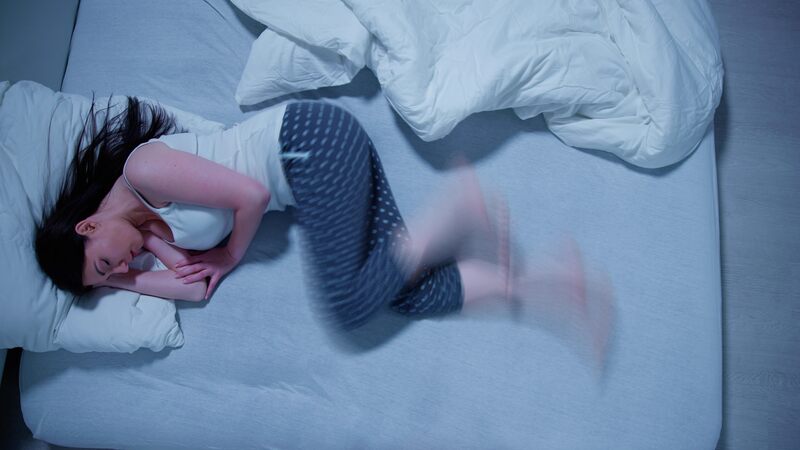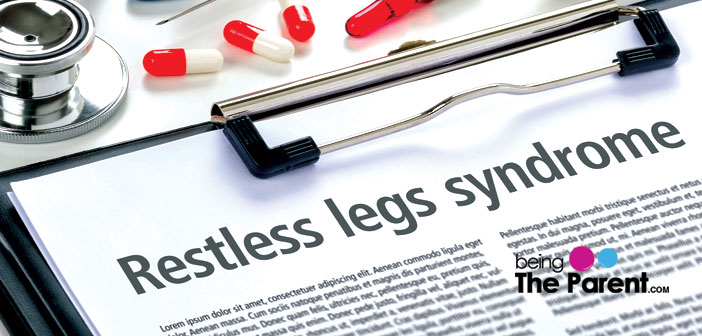
Come pregnancy, you bid a tearful good bye to a good night’s sleep. And it is a good bye for a very long time, because after delivery, your chances of a good sleep would become even less probable. Most of your friends would advise you to “sleep as much as possible” during pregnancy because after the baby you virtually get no sleep. Easily said than done, though. Throughout your pregnancy, you might find it difficult to sleep, thanks to heartburn, multiple pee breaks, a bulging stomach that makes no position comfortable to sleep in and so on. And come third trimester, you get an additional discomfort to add to that list – restless leg syndrome or RLS. About 15% to 30% of all pregnant women complain of it during pregnancies.
What Is Restless Leg Syndrome?
Restless leg syndrome or RLS refers to an uncomfortable sensation you feel in your leg during your sleep. The sensation can be itching, burning, tingling and so on. Some women even say it feels like something was crawling on their legs. The sensation gives you a strong urge to move your leg (hence the term “restless”) and once you move the leg, the sensation goes away. But alas, by then you are awake! The sensation comes back multiple times during the night, thereby ensuring you do not get proper sleep. And this, usually, makes you very tired, sleepy and irritable during the day. Especially because RLS appears almost every night in the last leg of your pregnancy.
Symptoms of restless leg syndrome could also be observed during long sitting hours like a long travel or a movie time. Though these sensations are mostly felt in the lower legs, you could also feel them developing in the f eet, thighs, arms, or hands as well. The symptoms will be at their worse during the 7th or 8th month of pregnancy, and should disappear soon after the delivery.
What Causes Restless Leg Syndrome During Pregnancy?
No one appears to have reached a consensus on what causes this restless leg syndrome. There are multiple possibilities, according to experts:
- Genetics
- Problems associated with a brain chemical (called dopamine) which is in charge of muscle movements
- Hormonal changes, especially rise in estrogen levels
- Deficiency of iron
- Deficiency of folic acid
The good news is that restless leg syndrome is temporary. It usually disappears after you have given birth! But meanwhile:

What Can You Do If You Have Restless Leg Syndrome During Pregnancy?
There are few ways to manage RLS and make it easier for you to sleep. Hope the following tips help:
- Say no to coffee: Or anything that contains caffeine. It is definitely not good for overall pregnancy health. And it is known to make RLS worse. We are not talking about avoiding coffee in the evening, we are talking about eliminating it from your diet altogether!
- Avoid lying down for long: Do not lie down if you are not sleeping. The longer you lie down, or the longer your legs are stationary, the chances of RLS creeping up is higher. So, do not lie down for an hour reading, fiddling with phone or watching TV. If you do, by the time you fall asleep, RLS would hit you immediately
- Relook at all the medicines you take: Many medications, including the ones you take for common cold, are known to make RLS worse. Some of the cough syrups can also makes RLS worse (although you might assume that it might make you sleep better due to its sedation effects)
- Think about supplements: Talk to your doctors about getting your prenatal vitamins checked. If a deficiency in iron or folic acid is causing the RLS, taking care of your nutritional requirements might reduce the symptoms of RLS
- Get a good massage: Regular leg massages are good during your pregnancy. It can also reduce problems related RLS. And in the night, if you wake up due to RLS, get your spouse to massage your leg until you fall asleep. Why should you have all the sleepless nights?!
- Check for connections between diet and RLS: See if the symptoms increase when you consume a certain type of food. You might want to maintain a food diary for few days to help you with this tip
- Try alternate healing: Some women state that alternate healing like acupuncture, yoga and meditation reduces RLS symptoms
- DIY tips: Do some leg stretches before you sleep or a pply hot or cold packs on your legs, whichever is more comforting
- Try a warm bath: Try a relaxing bath in warm water before you sleep that will calm you and your muscles
Here is hoping you get some good sleep before your bundle of joy turns you into a temporary insomniac!
Have a safe and healthy pregnancy.

